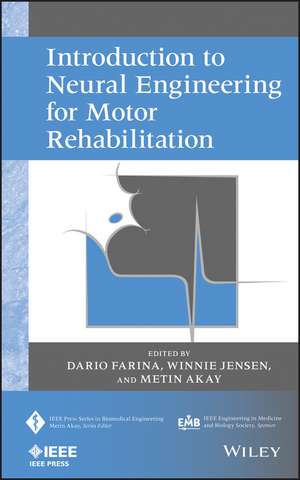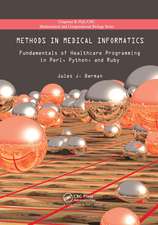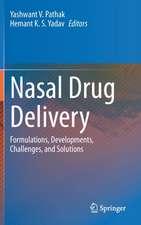Introduction to Neural Engineering for Motor Rehabilitation: IEEE Press Series on Biomedical Engineering
Autor D Farinaen Limba Engleză Hardback – 25 iul 2013
Din seria IEEE Press Series on Biomedical Engineering
- 24%
 Preț: 804.77 lei
Preț: 804.77 lei - 5%
 Preț: 1491.89 lei
Preț: 1491.89 lei - 9%
 Preț: 1128.04 lei
Preț: 1128.04 lei - 9%
 Preț: 1672.61 lei
Preț: 1672.61 lei - 9%
 Preț: 1141.52 lei
Preț: 1141.52 lei - 5%
 Preț: 1187.21 lei
Preț: 1187.21 lei - 5%
 Preț: 1419.16 lei
Preț: 1419.16 lei - 5%
 Preț: 959.79 lei
Preț: 959.79 lei - 9%
 Preț: 716.73 lei
Preț: 716.73 lei - 9%
 Preț: 985.60 lei
Preț: 985.60 lei - 9%
 Preț: 943.64 lei
Preț: 943.64 lei - 9%
 Preț: 809.47 lei
Preț: 809.47 lei - 9%
 Preț: 815.23 lei
Preț: 815.23 lei - 5%
 Preț: 874.51 lei
Preț: 874.51 lei - 5%
 Preț: 1148.47 lei
Preț: 1148.47 lei - 27%
 Preț: 832.32 lei
Preț: 832.32 lei - 27%
 Preț: 792.32 lei
Preț: 792.32 lei - 32%
 Preț: 1030.82 lei
Preț: 1030.82 lei - 32%
 Preț: 952.07 lei
Preț: 952.07 lei - 31%
 Preț: 946.90 lei
Preț: 946.90 lei - 32%
 Preț: 765.04 lei
Preț: 765.04 lei - 32%
 Preț: 791.19 lei
Preț: 791.19 lei -

Preț: 1015.91 lei
Preț vechi: 1116.38 lei
-9% Nou
Puncte Express: 1524
Preț estimativ în valută:
194.41€ • 201.74$ • 162.50£
194.41€ • 201.74$ • 162.50£
Carte tipărită la comandă
Livrare economică 15-29 martie
Preluare comenzi: 021 569.72.76
Specificații
ISBN-13: 9780470916735
ISBN-10: 0470916737
Pagini: 608
Dimensiuni: 166 x 235 x 32 mm
Greutate: 1.15 kg
Editura: Wiley
Seria IEEE Press Series on Biomedical Engineering
Locul publicării:Hoboken, United States
ISBN-10: 0470916737
Pagini: 608
Dimensiuni: 166 x 235 x 32 mm
Greutate: 1.15 kg
Editura: Wiley
Seria IEEE Press Series on Biomedical Engineering
Locul publicării:Hoboken, United States
Public țintă
Intended for those who work in the field of biomedical engineering, ranging from graduate students to senior researchers; the book will be essential for a PhD curriculum in biomedical or neural engineering.Cuprins
Notă biografică
DARIO FARINA is Professor and Founding Chair of the Department of Neurore-habilitation Engineering at the University Medical Center Göttingen, Georg-August University, Göttingen, Germany. He is also Chair for Neuroinformatics of the Bernstein Focus Neurotechnology Göttingen. WINNIE JENSEN is an Associate Professor at the Center for Sensory-Motor Interaction at Aalborg University, Denmark. METIN AKAY is Chair of the Department of Biomedical Engineering at the University of Houston, Texas. He is the founding editor-in-chief of the IEEE Press Series in Biomedical Engineering published by Wiley-IEEE Press. He is also the editor of ten Wiley-IEEE Press books.
Descriere
Neural engineering is a discipline that uses engineering techniques to understand, repair, replace, enhance, or treat diseases of neural systems. Currently, no book other than this one covers this broad range of topics within motor rehabilitation technology.





















